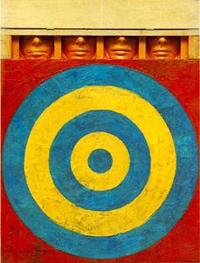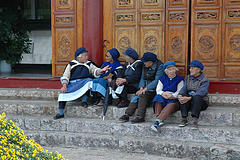The following is a guest post from frequent contributor Dr. Jerome Keating.
——————————————————————
Democracy, Paradigms, Bought Loyalties and Obfuscations
What price would one put on democracy? What would one trade democracy for? What would it take to sell out someone else’s right to self-determination?
A pair of pandas? Better trade relations? A chance to make more money? Or even the alleged glory of being the mythical white horse prince who could stake a claim that he/she brought Taiwan and China together?
Democracy is the real issue in the Taiwan/China debate and the questions on democracy are the real questions. The rest is all smokescreen and, pardon the word, obfuscation.
In a global age where national boundaries begin to blur and the world for better or worse begins heading more towards corporate identification and influence, the rights of the individual granted by democracy and rule of law remain and cry out for recognition. These are the same rights the People’s Republic of China (PRC) in its paradigm of control avoids discussing like the plague, be it SARS, bird flu or anything else.
In the same vein, as Lien Chan, James Soong, and so many other pan-blue leaders fawningly run to Beijing, they appear embarrassed to even bring up the ‘D’ word. If it is brought up, it is done in almost apologetic terms.
The distinct role that democracy must play in negotiations on Taiwan and China’s future is crucial. Behind democracy are the paradigms and priorities that people hold for themselves and these two countries. On one side is Taiwan’s experience of a long, hard struggle over a one-party state that has still not come clean on its past murders and thefts. On the other side is another one-party clique also steeped in suppression that justifies its control with the claim to be defender of the myth of one, indivisible China.
As a result, the Taiwan/China debate unfortunately continues to be smoked over by words and/or phrases like “independence, inalienable, inseparable, internal problem” and even “a shared common culture.”
Independence! In this debate, China has made no bones about its demand to forbid this word in discussions of the future. There can be no talk of Taiwan independence. Such a demand by the PRC is tantamount to saying both sides must agree to come to the PRC’s conclusion and control before they begin to debate, still statements of non-negotiables are a part of bargaining. Taiwan’s pan-green leadership has stated its own non-negotiable by saying that both sides must come to the table as equals and have the freedom of choice of equals.
What is most surprising, however, is the complete lack of non-negotiables or sine qua non’s from the pan-blue leadership.
In the old controversial days of Chiang Ching-kuo, the Kuomintang (KMT) at least had fire in its belly in dealing with the PRC. At that time they were bold enough to state their own three no’s, “no contacts, no negotiations, no compromise.” Now in sharp contrast, KMT leaders trip and fall over each other as they run to bow and scrape to accommodate the PRC. Such kow-towing makes any rational person ask why.
Where has the fire in the belly gone? What has changed? The answer lies in seeing the KMT’s true past paradigms and priorities and how these were affected by democracy.
The KMT that was brave enough to issue its three no’s was one which gave lip service to democracy. It did this because it operated from the paradigm of the secure power and privilege of a one-party state similar to that of the PRC. Hidden behind its three no’s was its own basic sine qua non that saw unification only in terms of the KMT maintaining power over all.
Democracy ruined that for the KMT; it broke their paradigm of privilege and destroyed their sense of entitlement to power. Democracy is the antithesis of any one-party state paradigm. Choice and absolute control cannot co-exist. Democracy allows the people to vote a government out; understanding this, the KMT knows full well why it is anathema to bring the word up with the PRC and so it bows in submission.
One cannot say the pan-blue have totally avoided mentioning democracy. To his credit, James Soong hinted at it by once saying that perhaps it might be best to put off any discussion of unification for another thirty to fifty years and just expand trade links etc. Ma Ying-jeou in his usual pussy-footing way of trying to keep his feet in two boats also hinted at the issue. In an interview he stated that he suspected that the PRC is still a ways from democracy. Nowhere however, and I say nowhere, has there been anything close to making democracy a non-negotiable part of or a sine qua non for discussions.
Why not? Why are there no non-negotiable on discussions from the pan-blue side? The scenario is strangely reminiscent of seventeenth century China when the Qing was defeating the Ming. In this process the loyalty of several Ming generals and leaders was bought off by the Qing. By 1679, the Qing had even created the Xiu Lai compound where opposing generals and leaders could surrender and retire in comfort. This was certainly part of the enticement they offered to followers of Zheng Zhi-long, the father of Zheng Cheng-gong (Koxinga). Zhi-long had been bought off but of course he then faced reciprocal obligations.
When Zheng Zhi-long came home to the Qing, he was expected to bring with him his son Zheng Cheng-gong and all of his troops. When they didn’t come, Zhi-long’s wife Tagawa committed suicide and Zhi-long didn’t get a chance to enjoy his retirement. Bought loyalty, particularly between past enemies, must still deliver.
Zhi-long had promised to deliver his son; have the pan-blues promised to deliver Taiwan? Is this the real reason why they continually block bills to procure defensive weapons in the legislature?
As the PRC wines and dines the pan-blue leaders and legislators it would seem the same machinations are at work. The pan-blue leadership remains surprisingly quiet on any mention of democracy as a non-negotiable/sine qua non for discussions on future relations between Taiwan and China. Instead they talk of harmonious interests; how close the talk seems to Xiu Lai (cordial relations).
At stake here are conflicting paradigms on Taiwan. Where are each party’s priorities and how does democracy fit in? Operating from a paradigm of hard won democracy the pan-green camp maintains its right to self-determination. Since democracy by its nature allows many points of view and free choice, it has to be open to voting on unification or not. The flip side is that it also is open to vote on rejecting it. The pan-blue camp refuses to cross that bridge.
The pan-blue camp is still mired in its one-party state paradigm, the same paradigm as held by the PRC. The priority of this paradigm is that the one-party state must first control all. The unification of Taiwan and China must always take precedence over democracy. Lip service can be given democracy but control must dominate over free choice as in Hong Kong. Thus the KMT would rather see a Taiwan that is stripped of its democracy and a part of China than one with choice. Are the benefits and future privileges of such a metaphorical Xiu Lai really worth that?
Democracy denies privilege to any one party and places it in the hands of the people. The people can bestow the privilege of leadership on those whom they feel worthy; they can also take it away in the next election
The issue of independence is a smokescreen. For over a half a century, Taiwan is and has been independent whether as a one-party state under the KMT or a democracy since 1996.
The real issue is the role of democracy in Taiwan’s future as it relates to China. Since 1996 when the people first directly elected their president, Taiwan has utilized that freedom of choice twice. In the elections of 2000 a peaceful transfer of power took place. In 2004 it was confirmed. Taiwan’s democracy won at the cost of blood, sweat and suffering should not be sacrificed for “cordial relations.”
The KMT fought the PRC only as long as they were masters in Taiwan. Once the people exercised the democratic right to vote and voted them out of office, the blue camp lost interest in democracy. More like lost dogs seeking to lick the hand of the bully that drove them off the mainland, they return. Better to be someone else’s live dog than a dead lion may be an appropriate proverb. Perhaps they will get a bone.
This paradigm also reveals the true feelings of those waishengren that have never found a home in Taiwan. Comfortable in Taiwan only if they could be superior colonial masters, they seek other advantage once that privilege is lost.
Slogans once expressed the pseudo KMT dedication. Who cannot recall, “Gentlemen will not stand with thieves” which expressed the KMT distaste of co-existing in the UN with the PRC. As Lien Chan and others wine and dine with Chinese Communist Party (CCP) leaders and vow that as brothers they will fight Taiwan’s independence (translate democratic choice) one wonders what the new slogan will be?
Carved on Kinmen’s highest mountain are the words “Remember our days at Chu.” And elsewhere is found another demand. “Give me back my land.” How times have changed. It now appears that the pan-blue slogan could be “Forget Chu and go for the money.” Westerners had a saying, “Better dead than Red.” Current pan-blue feelings reflect “Better Red than lose power and privilege.”
As China and Taiwan approach discussions, Taiwan voters have a right to know what paradigms and priorities each party holds. There has never been transparent accountability on the state assets taken by the KMT, nor has there been true accountability on all involved with the suppression and deaths during the White Terror period. Will the KMT’s position on democracy be added to this list?
__________________________
Jerome F. Keating Ph.D. has lived and worked in Taiwan for the past sixteen years and is co-author of “Island in the Stream, a Quick Case Study of Taiwan’s Complex History” and other works. Other writings can be found at http://zen.sandiego.edu:8080/Jerome


Comments